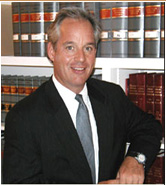By Brendan O”™Rourke
My small firm, O”™Rourke & Associates in New Canaan, represents companies and individuals in a variety of commercial disputes. We have handled trials in federal and state courts in Connecticut and New York. We also have conducted arbitrations before the American Arbitration Association and the Financial Industry Regulatory Authority (“FINRA”).
Every commercial litigator knows that almost all commercial litigation inevitably involves a dispute over money. We also know that a claim for money is a very divisive issue, and often invokes a strong emotional response from clients. In my experience, other than divorce litigation, litigation arising from the termination of a long-standing business partner or employee can generate the most visceral responses. The terminated partner seeks vindication in the litigation process, seeing a substantial monetary recovery as just compensation for the value of his or her contributions, and ratification of his or her self-worth. When such sentiment is matched against a well-capitalized former employer intent on using the litigation process to wear down its now adversarial, former partner, you have a recipe for a perfect storm of litigation. We recently represented such a client in that exact setting, and were fortunate to obtain a total victory, by gaining for our client both a significant monetary award and vindication.

The story starts with the collapse of the World Trade Center Towers on 9/11, and ended across the street at the FINRA offices some ten years later. Our client, Andrew, was a senior vice president and partner at a major Wall Street Firm. He had been made a partner in the 1990s, and helped develop a successful, convertible securities department. Andrew”™s firm had its main office at the North Tower of the World Trade Center and suffered devastating losses on 9/11. Andrew survived the devastation because he happened to be working in the Firm”™s Darien office. Andrew attended over a hundred funerals of deceased partners and employees, and volunteered his time to work with family members of the deceased. After 9/11, he expended tremendous efforts building the firm back, and mentoring many younger sales and trading professionals. He also volunteered his time as a local ice hockey coach on teams on which his three young boys played.
After the 2008 financial meltdown, the firm”™s business slowed, but Andrew”™s department remained profitable. Then, in May of 2009, two lower-level employees appeared in his office. He was informed that he was terminated. None of his supervisors gave him the courtesy of a phone call. As part of the termination papers, he was offered a $7,400 severance for his 14 years of devoted service to the firm.
Rather than accepting this offer, Andrew decided to fight the injustice. We were hired. The firm reacted by raising its offer of severance, but it was still a pittance compared to Andrew”™s value and lost income. As a result, we filed an arbitration claim with FINRA against the firm, which then retained a large institutional law firm to defend it through expensive “scorched earth” litigation tactics. Andrew remained committed to litigation and would not settle by accepting the steep discount offered by the firm.
The FINRA arbitration took place at One Liberty Plaza, across the street from the former World Trade Center. The arbitration spanned an entire year, during which we watched the new One World Trade Center, formerly known as the Freedom Tower, rise from where the two towers were destroyed. During the arbitration, the firm sought to portray Andrew as incompetent and undeserving, and claimed that he was owed nothing. We presented the full history of Andrew”™s success, and his role in helping salvage the Firm and mentoring new professionals, as well as the relative profitability of his department notwithstanding the 2008 financial downturn.
After deliberating for several weeks, the FINRA Panel awarded Andrew $1,241,768, which includes $326,000 for the attorney”™s fees that he paid to my firm in fighting his former employer. Unhappy with this result, the firm challenged the award in New York Supreme Court, which required Andrew to incur additional attorney”™s fees of nearly $100,000. Ultimately, the New York Appellate Court in Manhattan upheld the entire award.
Andrew had to expend over $400,000 to fight his former firm. But that investment turned out well worth it. He received a large monetary award, and, of equal importance, he vindicated himself and his hard work on behalf of the firm. The appeal, which is a public record, can be seen by his professional colleagues and peers by examining the record of the New York Appellate Division/ First Department: Index No. 650280/2012.
Andrew had to expend over $400,000 to fight his former firm. But that investment turned out well worth it. He received a large monetary award, and, of equal importance, he vindicated himself and his hard work on behalf of the firm.



















